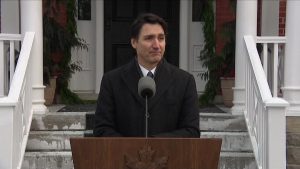Justin Trudeau's announcement on Monday marks a turning point for the Liberal Party and presents an opportunity for voters to reassess the nation's political direction after a decade of his leadership characterized by controversy and division.
Trudeau Announces Resignation: A Pivotal Moment for Canadian Politics

Trudeau Announces Resignation: A Pivotal Moment for Canadian Politics
In a significant shift within the Canadian political landscape, Prime Minister Justin Trudeau has declared his intention to step down as leader of the Liberal Party amidst internal strife and declining support.
As Prime Minister Justin Trudeau steps down from his role as Liberal Party leader, he acknowledges the internal conflicts that have marred his administration. Speaking outside Rideau Cottage, he emphasized, “This country deserves a real choice in the next election", indicating his belief that his internal struggles render him unfit for the electoral battle ahead. Trudeau's leadership has faced increased scrutiny, as disillusionment with his government mounts, particularly regarding pressing issues like inflation, energy regulation, and national cohesion.
Speculation around Trudeau's potential departure has been rife, exacerbated by his government's perceived detachment from the realities faced by many Canadians. Critics charge that Trudeau has focused more on international matters at the expense of domestic welfare, leaving substantial segments of the population feeling excluded from the national conversation. His progressive agenda, rooted in climate and social justice, while gaining traction globally, has incited backlash in traditional energy hubs like Alberta.
For the Conservative Party and other opposition groups, Trudeau's resignation symbolizes a long-anticipated opening to challenge what they describe as years of economic mismanagement. The culmination of ethical controversies, rising deficits, and a divisive leadership style has created an environment ripe for alternative approaches.
The Liberal Party now stands at a crossroads, tasked with identifying a new leader capable of mending internal conflicts and resonating with a disenchanted electorate. This transition period poses both a challenge and an opportunity for the opposition parties, who are likely to leverage this moment to present a contrasting vision for Canada in anticipation of the next election.
Ultimately, Trudeau's resignation marks the conclusion of a contentious chapter in Canadian politics, one characterized by high aspirations but also significant challenges left unaddressed. As the Liberal Party embarks on the search for a successor, Canada faces a crucial juncture where voters may call for a shift away from the progressive policies that have been central to the Liberal agenda over the past decade.
Speculation around Trudeau's potential departure has been rife, exacerbated by his government's perceived detachment from the realities faced by many Canadians. Critics charge that Trudeau has focused more on international matters at the expense of domestic welfare, leaving substantial segments of the population feeling excluded from the national conversation. His progressive agenda, rooted in climate and social justice, while gaining traction globally, has incited backlash in traditional energy hubs like Alberta.
For the Conservative Party and other opposition groups, Trudeau's resignation symbolizes a long-anticipated opening to challenge what they describe as years of economic mismanagement. The culmination of ethical controversies, rising deficits, and a divisive leadership style has created an environment ripe for alternative approaches.
The Liberal Party now stands at a crossroads, tasked with identifying a new leader capable of mending internal conflicts and resonating with a disenchanted electorate. This transition period poses both a challenge and an opportunity for the opposition parties, who are likely to leverage this moment to present a contrasting vision for Canada in anticipation of the next election.
Ultimately, Trudeau's resignation marks the conclusion of a contentious chapter in Canadian politics, one characterized by high aspirations but also significant challenges left unaddressed. As the Liberal Party embarks on the search for a successor, Canada faces a crucial juncture where voters may call for a shift away from the progressive policies that have been central to the Liberal agenda over the past decade.





















